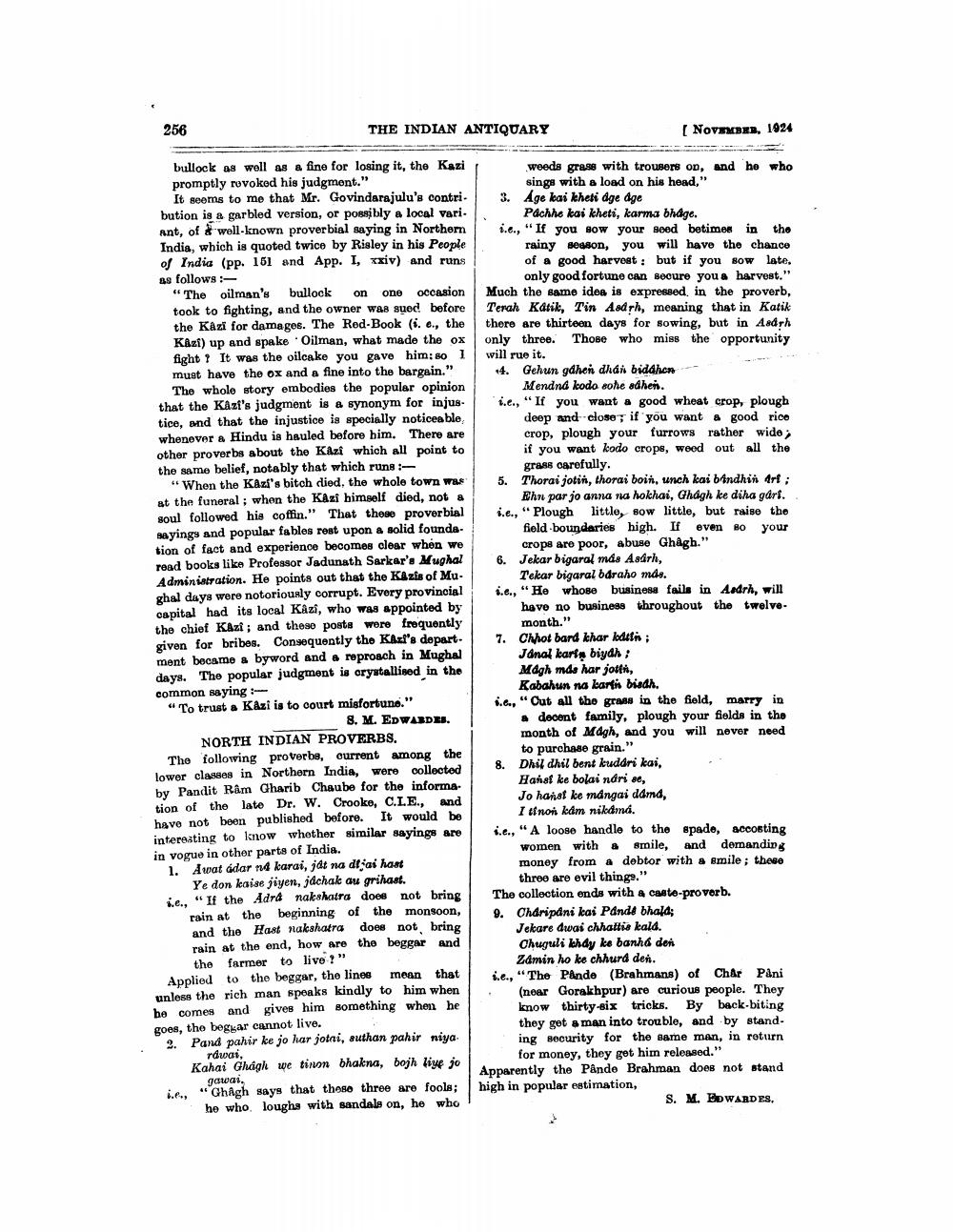________________
256
THE INDIAN ANTIQUARY
(Nov
, 1924
bullock as well as a fine for losing it, the Kazi
weeds grass with trousers on, and he who promptly rovoked his judgment."
singe with a load on his head," It seems to me that Mr. Govindarajulu's contri. 3. Age kai lheti dge dge bution is a garbled version, or possibly a local vari. Pachhe kai kheti, karma bhdge. Ant. of well-known proverbial maying in Northern i.e., "If you sow your seed betimes in the India, which is quoted twice by Risley in his People
rainy seson, you will have the chance of India (pp. 151 and App. I, xxiv) and runs
of a good harvest : but if you now late. as follows -
only good fortune can secure you a harvest." "The oilman's bullock on one occasion Much the same idea is expressed in the proverb, took to fighting, and the owner was sued before Terah Katik, T'in Asdrh, meaning that in Katik the Kazi for damages. The Red-Book (i.6., the there are thirteen days for sowing, but in Asdrh Kazi) up and spake Oilman, what made the ox only three. Those who miss the opportunity fight? It was the oilcake you gave him so I will rue it. must have the ox and a fine into the bargain." 14. Gehun gdhen dhái biddhan The whole story embodies the popular opinion
Mendnd kodo sohe adhen. that the Kazi's judgment is a synonym for injus- 6.e., "If you want a good wheat crop, plough tice, and that the injustice is specially noticeable
deep and close if you want a good rice whenever a Hindu is hauled before him. There are
crop, plough your furrows rather wide other proverbs about the Kazi which all point to
if you want kodo crope, weed out all the the same belief, notably that which runs :
grass carefully. "When the Kazi's bitch died, the whole town www 5. Thorai jotin, thorai boin, unch kai bindhin drf: at the funeral; when the Kazi himself died, not a
Ehn par jo anna na hokhai, Ghagh ke diha gårf. soul followed his coffin." That those proverbial s.e., "Plough little, sow little, but raise the sayings and popular fables rest upon a solid founda
field boundaries high. If even your tion of fact and experience becomes clear when we crops are poor, abuse Ghagh." read books like Professor Jadunath Sarkar's Mughal 6. Jekar bigaral más Asdrh, Administration. He points out that the Klzis of Mu. Tekar bigaral bdraho mds. ghal days were notoriously corrupt. Every provincial 1.e., "He whose business fails in Andrh, will capital had its local Kazi, who was appointed by have no business throughout the twelve. the chief Kazi; and these posts were frequently month." given for bribes. Consequently tho Kazi's depart. 7. Chhot band khar kain; mont became a byword and a reproach in Mughal Jánal kariş biydh; days. The popular judgment is crystallised in the Magh mde har jotti, common saying :
Kabahun na karin biadh. “To trust a Kazi is to court misfortune."
1.6., “Cut all the grass in the field, marry in 8. M. EDWARDES.
docent family, plough your fields in the NORTH INDIAN PROVERBS.
month of Magh, and you will never need The following proverbe, current among the
to purchase grain." lower classes in Northern India, were collected
8. Dhil dhil bent kuddri kai by Pandit Râm Gharib Chaube for the informa
Hansi ke bolai nori se, tion of the late Dr. W. Crooke, C.L.E., and
Jo hansi ke mangai damd, have not been published before. It would be I tfnor kám nikdma. interesting to know whether similar sayings are "A loose handle to the spade, accosting in vogue in other parts of India.
women with a smile, and demanding 1. Awat ádar nd karai, jdt na dljas hast
money from a debtor with a smile; these Ye don kaise jiyen, jdchal du grihast.
three are evil things." Ke., "If the Adra nakshatra does not bring The collection ends with a carte-provorb.
rain at the beginning of the monsoon, 9. Charipdni kai Pande bhala; and the Hast nakshatra does not bring Jekare dwas chhattis kald. rain at the end, how are the beggar and
Chuguli kehdy ke banha det the farmer to live ?"
Zamin ho ke chhurd den. Applied to the beggar, the linee mean that
1.e., "The Pande (Brahmans) of Char Pani unless the rich man speaks kindly to him when
(near Gorakhpur) are curious people. They he comes and gives him something when he
know thirty-six tricks. By back-biting goes, the begkar cannot live.
they get a man into trouble, and by stand2. Pand pahir ke jo har jotai, suthan pahir niya.
ing security for the same man, in return rdwai, Kahai Ghagh we tinon bhakna, bojh liye jo
for money, they get him released." garai.
Apparently the Pande Brahman does not stand ir, "GhAgh says that these three are fools; high in popular estimation, he who loughs with sandals on, he who
S. M. EDWARDES,




